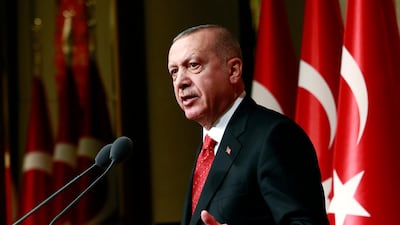Turkey has finalised a deal to buy Russian S-400 missiles, President Recep Tayyip Erdogan said on Wednesday night, in an agreement that brings with it the threat of US sanctions and even risks undermining the country’s role in Nato.
For months, Ankara has warned the US and other Nato allies that it would go ahead with the $2.5 billion (Dh9b) purchase of the surface-to-air missiles, despite warnings they would be incompatible with the Nato air defence umbrella. The move would also see Turkey locked out of receiving the next generation of F-35 stealth fighter jets from the US.
Yet Turkey’s determination to pursue the Russian deal comes after years of seeking to update its air defences – a quest that has seen it previously negotiate fruitless deals with Nato members France, Italy and the US, as well as China.
During that time, missiles have fallen on southern Turkish towns due to the Syrian conflict and an attempted coup in 2016 led to rogue Turkish Air Force pilots flying US-designed F-16 and F-4 jets over Istanbul and the capital Ankara, where they attacked parliament and the presidential palace.
Mr Erdogan himself faced danger on the night of the coup, narrowly escaping an attack on his holiday retreat by helicopter-borne commandos before flying to Istanbul, running the risk of being shot down on the way.
Talk of buying the S-400s first emerged shortly after the failed coup, when more than 250 people were killed.
A deal was signed in December 2017 and it was recently reported that Turkish personnel have already travelled to Russia for training. According to the Haberturk newspaper, Russian staff will visit Turkey at the end of the month to prepare for the installation of the missiles.
“After the coup attempt, Mr Erdogan’s first visit abroad was to St Petersburg and on the flight back he talked about buying the system from Russia,” said Mitat Celikpala, an international relations professor at Istanbul’s Kadir Has University.
“Most likely, Russia offered the deal to Mr Erdogan, whose threat perception in those days was very high and the only way to protect himself from another coup d’etat attempt was the Russian missile system.”
Defence Minister Hulusi Akar fuelled such a suggestion when he said in April that S-400s would “probably” be stationed in Istanbul and Ankara. On Thursday, Bercan Tutar, a columnist for the pro-government Sabah newspaper, said the missiles should be delivered on 15 July, the third anniversary of what he called the “West-supported” coup attempt.
Training for Turkish pilots on flying the F-35, the development of which Ankara has contributed US$1b to since 2002, was halted this week over the S-400 controversy. The US claims that operating the Russian missiles and the F-35 simultaneously would give Russia access to their aircraft's secrets.
The US Congress has also passed a resolution calling for sanctions against Turkey’s recession-hit economy if the missile deal progresses.
As well as these immediate responses, the S-400 deal threatens to undermine Turkey’s role in Nato – a cornerstone of its security policy since it joined in 1952.
It appears that Mr Erdogan is hoping to avoid the damaging repercussions of the Russian agreement by appealing to US President Donald Trump personally, first by telephone and later with a meeting at the G20 summit in Japan in two weeks.
The wider issue behind the S-400 purchase is the realisation in Ankara that Turkey’s interests do not align with the US’s as they once did. In particular, Washington’s support for Syrian Kurdish fighters that Turkey considers terrorists and Ankara’s ongoing bid to extradite the man it holds responsible for the attempted coup from the US.
Aaron Stein, Middle East director at the US-based Foreign Policy Research Institute, said improving relations between Turkey and Russia means “bad could turn into grievous” for US-Turkish ties.
Writing in the War on the Rocks website last month, he added that “the Turkish-Russian entente further undermines Ankara’s position within Nato”.
With Turkey's ties to Nato coming under such pressure, some have wondered if links to Russia will prove enduring. On Wednesday, the two countries agreed a ceasefire in the Syrian rebel enclave of Idlib, where two million potential refugees lie on Turkey's border, but Moscow has yet to signal its willingness to share the technology that allows them to develop missiles, which is what Ankara really craves.
“For Russia, Turkey seems to be the weakest link for trying to weaken Nato,” Prof Celikpala said.

